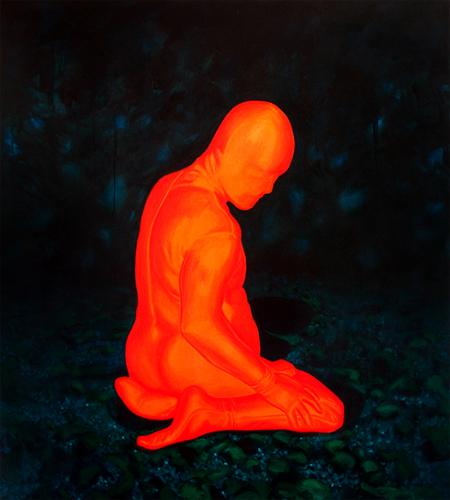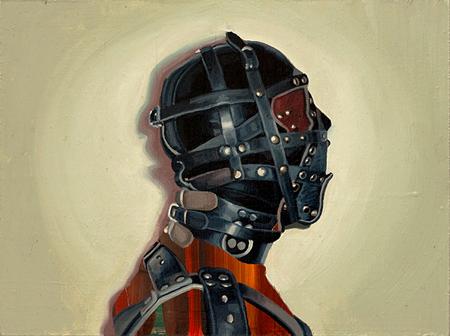
Ian Shatilla's Party for One (72.5" X 72" oil on convas) is one of the pieces in his show Consuming Defeat.
At first glance, Montreal artist Ian Shatilla’s latest series of paintings appear to be an exploration of SM sexuality. The show, titled Consuming Defeat, features gorgeous images of men in latex masks, some also donning leather gear and chains.
But that’s at first glance. As with most great art, there’s something lurking beneath the surface of these striking paintings. Indeed, Shatilla says he painted them after hearing the news that his long-time boyfriend had cancer and was facing an uphill battle for survival.
“The past four months made me think about how we hide behind masks at all times,” says Shatilla. “My intention was never really to get into SM issues. But I can see how that became a theme, inadvertently.”
Shatilla points out that “a mask allows us to cover up, to become anonymous. I think when people are grieving there’s a sense that they want to retreat. We all deal with defeat in many different ways. We deal with defeat when we watch the news every day, which generally shows us bad news, like earthquakes.”
Shatilla’s work is over-the-top, at once real and pushing the envelope into the surreal. He uses oversaturated primary colours to make the works inviting to the eye – at the same time, you can sense something darker when you look at the series in its entirety. One self-portrait depicts Shatilla with a terribly pained and anguished expression on his face. “I painted that while thinking about the BP oil spill. How do we deal with defeat on that level, politically, culturally and personally? That can be terribly hard. I called it simply Oil Spill.”
A graduate of Dawson College and Concordia University, Shatilla says he wanted to paint the works in big, bold colours and to make them gorgeous to behold, in stark contrast to the dark themes and ideas he was confronting. “The subject matter is a downer, but I wanted the paintings to be beautiful.”
A gay artist confronting mortality prompts the obvious question: is our community especially well-versed with the spectre of death and illness, given our collective experience with AIDS? “I think that’s quite generational. I am 28, so I never had to go through that. This is new to me.”
Shatilla says he wasn’t even sure what the paintings were really about as he created them. His grief and shock came to the fore after, when he was composing his artist’s statement for the show. “A lot of conceptualizing went into the work after the fact. I realized how much of my personal situation went into the work. It is distinctly autobiographical. Even though I was thinking about politics as I did these paintings, what I have been going through makes the work much more personal.”

 Why you can trust Xtra
Why you can trust Xtra


